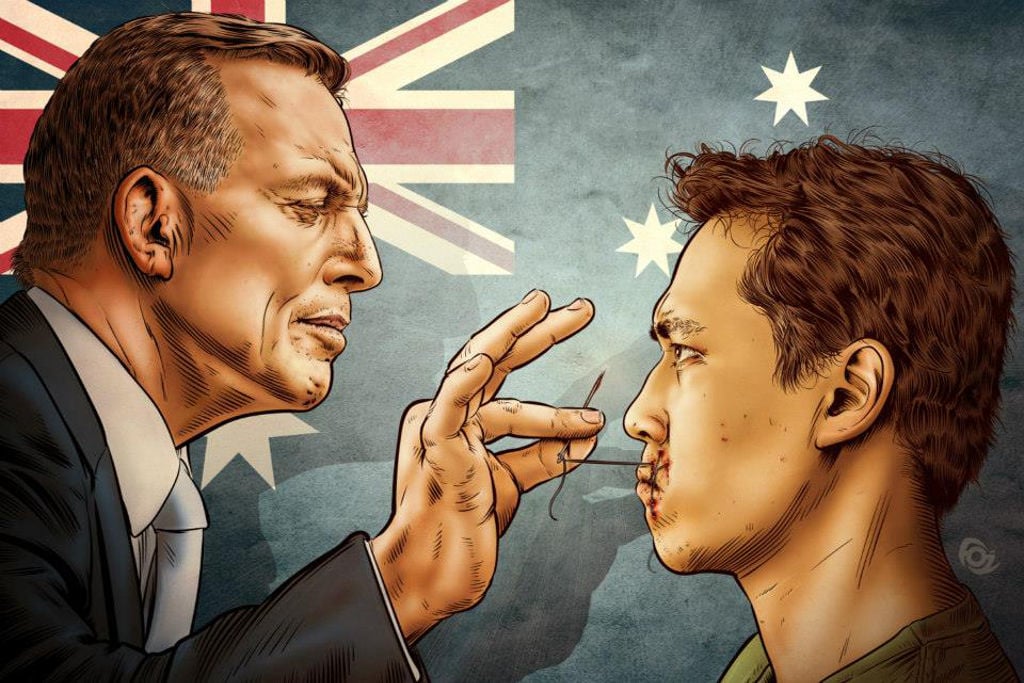The New York Times Has Condemned Australia’s “Brutal” And “Inexcusable” Refugee Policies
"Prime Minister Tony Abbott's policies have been inhumane, of dubious legality and strikingly at odds with the country’s tradition of welcoming people fleeing persecution and war."

Australia’s long-standing policy of mandatory offshore detention for asylum seekers arriving by boat has been a source of profound shame, both domestically and internationally, for a long time.
In the last year alone, our offshore detention camps have attracted scathing criticism from the United Nations Human Rights Council, the UN Committee Against Torture, the Australian Human Rights Commission, Australian expats, a bedroom-bound Russell Brand, and the kids inside the camps themselves.
Now joining that illustrious list is the New York Times, who yesterday ran an editorial, titled ‘Australia’s Brutal Treatment of Migrants’, condemning Australia’s refugee policies as “inexcusable” and “unconscionable” and urging European nations to avoid going down the same path of deterrence.
“Prime Minister Tony Abbott has overseen a ruthlessly effective effort to stop boats packed with migrants, many of them refugees, from reaching Australia’s shores,” the editorial states. “His policies have been inhumane, of dubious legality and strikingly at odds with the country’s tradition of welcoming people fleeing persecution and war.”
This in the New York Times about Australia is damning, shameful and thoroughly fair. Please share it. #auspol pic.twitter.com/yT7FyTBBW7
— Van Badham (@vanbadham) September 3, 2015
The editorial then goes on to list some of the worst consequences of Australia’s offshore detention policy, with the barely-contained disgust of someone discovering our actions for the first time. Some highlights:
“Since 2013, Australia has deployed its navy to turn back boats with migrants, including asylum seekers, before they could get close to its shores. Military personnel force vessels carrying people from Iraq, Afghanistan, Sudan, Eritrea and other conflict-roiled nations toward Indonesia, where most of the journeys begin.
“A boat captain recently reported that Australian authorities paid him $30,000 to turn back. If true, that account, which the Australian government has not disputed, would represent a violation of international laws designed to prevent human smuggling and protect asylum seekers.
“…A report this week by an Australian Senate committee portrayed the Nauru center as a purgatory where children are sexually abused, guards give detainees marijuana in exchange for sex and some asylum seekers are so desperate that they stitch their lips shut in an act of protest.
“Instead of stopping the abuses, the Australian government has sought to hide them from the world.
“The Border Force Act, which took effect July 1, makes it a crime punishable by a two-year prison sentence for employees at detention camps to discussthe conditions there publicly.
“…Scores of people who have worked at the camp have become whistle-blowers. More than 40, including medical personnel and social workers, wrote a public letter to senior government officials in July saying they would rather risk arrest than stay quiet.
“‘If we witness child abuse in Australia we are legally obliged to report it to child protection authorities,’ they wrote. ‘If we witness child abuse in detention centers, we can go to prison for attempting to advocate for them effectively.’
I very much fear The New York Times has joined the Fairfax/ABC jihad against the Abbott gummint.
— Mike Carlton (@MikeCarlton01) September 3, 2015
The editorial concludes with the following:
“The world’s war zones are all but certain to continue to churn out an extraordinary number of refugees and economic migrants in the years ahead. Those people understandably will head to the most prosperous nations, hoping to rebuild their lives.
“It is inexcusable that some find themselves today in situations that are more hopeless and degrading than the ones that prompted them to flee.”
–
Feature image via James Fosdike; you can Like and Share it on Facebook via Visualante.